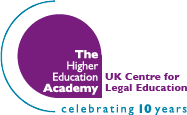Search
Pages (30)
Wikis: a tool for distributive writing
Advice on the use of wikis in legal education by Paul Maharg (Glasgow Graduate School of Law), including an overview of the benefits of using wikis, what you need to get started, a tip sheet including two sample wiki tasks, pointers as to what to watch out for, examples, tips an…
The 2009 Conference wiki
Learning in Law Annual Conference 2009: using wikis in legal education Before, during and after… The wiki’s lifespan extended beyond the conference itself: before the conference – all presenters had their own page and were invited…
Exhuming human remains from case law: a report on the first dig
Dawn Watkins (University of Leicester) presented the findings of a research project seeking to endorse and encourage the use of narrative research in legal education. Dawn’s slides are embedded below, and you can also download her full paper (Word file, 37 pages, 152 …
Using e-learning in legal education
immersive virtual worlds Using e-assessment Wikis: a tool for distributive writing Latest case studies: An exploratory study into the use of interactive technology to teach law Moodle: open source e-learning Second guessing: is there a context for Second Life in…
Back to the blackboard? Learning how to learn and teach in the ‘shifting sands’ of technology
the forefront of some developments.E.g. Wikis, podcasts, EVS: Cubric (2007) , Anderson & Hilliard (2007) , Wiggins (2008) These facts coupled with the growth in distance learning University of Hertfordshire’s 2010-15 aspiration is to have 25% of its learning and teaching …
Learning in Law Annual Conference 2008: (Dis)integration...designs on the law curriculum
demonstration and discussion of their use of blogs, wikis and gaming in the teaching of law, introducing the idea of creating conceptual spaces for learning to foster creativity. Blogs and wikis can aid teaching and learning by: encouraging collaborative learning suppo…
Leading today's people towards tomorrow's law school
interesting to explore a comparison of the use of wikis within institutional VLEs with Facebook. Are students more willing to use Facebook since it is more familiar, or do some prefer to keep their social and academic lives distinct? Lynn discussed a slightly different aspect…
Socrates and Confucius: a long history (?) of information technology in legal education
learning techniques based on group learning, wikis, the use of virtual reality systems, drama and transactional learning, reflect both contemporary critiques of the Socratic method and the original wisdom of Confucius. Karen Barton (University of Strathclyde) reports: One of t…
Teaching with emotional intelligence: delivering ethical lawyers and humane social workers through the VLE
In their paper Debbie Stringer (Open University) and Odette Hutchinson (Aston University) outlined their experiences developing ethical lawyers and humane social workers using the affective domain in teaching law and ethics. The session was blogged on Zeugma. It is likely…
Using podcasts to develop students' referencing skills using OSCOLA
staged tasks was developed using WebCT and wikis specifically targeting these aspects of academic writing skills as part of the process of enabling, encouraging and enhancing student learning. The poster focused on one particular element – the OSCOLA system used in refer…
Producing sound recording with Audacity
Some tutors also run discussion boards or wikis to provide a forum for discussion of issues raised by recorded lectures. Practical tips create a folder for your Audacity files, whether purchased as pre-recorded sound or your own, on your computer’s hard drive (using …
Making VLEs more interesting
the checking for new content on blogs and wikis: UKCLE’s Digital Directions PanGloss (online privacy and security law) TechnoLlama (technology law) Zeugma (legal education and more) …
Learning in Law Annual Conference 2008: (Dis)integration...designs on the law curriculum
described include mobile learning and using wikis, as well as innovative curriculum design Critique – setting up a law school, legal education in Wales, e-learning issues and student motivation Engagement – concept mapping as a tool for self assessment and the va…
In the looking glass: reflection on past experience as a key to the future
are being piloted to overcome this – wikis have been intoroduced to allow students to have a dialogue on their cases and experiences, and the use of journaling is being trialled with the aim of improving the quality of written reflections. “L…
Interdisciplinary learning for the work-based student
modules utilising e-learning via podcasting, wikis to support interaction and online tests. Her paper covered design issues, the use of blended learning, peer to peer collaboration, pastoral support and issues in the affective domain. She also reviewed the findings of two rec…
Will video kill the manuscript scrawl? The impact of video feedback on students’ perception of feedback
students felt that the use of podcasts, wikis or blogs by their tutors was helpful to their learning (Bone, 2009). For this project, the creation of a podcast of a generic feedback/revision session (such as that used by Almond (2009), was considered but rejected because of the d…
Moodle: open source e-learning
activities (forced paths through a course) wikis Moodle voice (hopefully!) Are there any disadvantages? There are one or two. The lack of flexibility when obtaining data about groups of students – for example if the tutor wants to check who has completed the preparatio…
Creativity in the law curriculum
for a class assignment on Russian lawyers. Wikis are an online collaborative tool developed in the early 1990s that allow novice users to build collections of resources in a Web-based environment – the most well known wiki is probably Wikipedia. The class consisted of 1…
Home
The UK Centre for Legal Education (UKCLE) works with law teachers, students, institutions and professional bodies at the academic and vocational stage to improve the student learning experience.…
About Us
The UK Centre for Legal Education (UKCLE) was established in January 2000 with the aim of promoting the development of learning and teaching in law at both the academic and vocational stages. We work with the legal education community with the aim of improving the student lear…
UKCLE Advisory Board
The UKCLE Advisory Board is made up of nominated representatives from legal education organisations and interest groups and our host institution, plus a number of co-opted members invited to join because of their particular expertise in legal education. The main function of th…
UKCLE vision
Vision, Mission and Values Vision Our vision is to support UK law schools in providing all students with the opportunity to experience a world class legal education. Mission The UK Centre for Legal Education promotes a scholarly and discipline specific approach to the i…
Contact UKCLE
You can contact UKCLE by mail, phone, fax, e-mail or by visiting us. UK Centre for Legal Education University of Warwick Coventry CV4 7AL Tel: 024 7652 3117 Fax: 024 7652 3290 E-mail: ukcle@warwick.ac.uk We are based in the School of Law at the University of Warwi…
Privacy
Data Protection Act 1998 The UKCLE members database contains the details you submit to us via our registration form, events bookings or other correspondence. This database will remain private to UKCLE. We shall not make it publicly available (for example on this website), nor …
UKCLE monitoring and evaluation
UKCLE evaluation 2009-10 The UKCLE evaluation strategy aims to reveal the extent to which UKCLE has been successful in enhancing learning and teaching in law. Qualitative and quantative data is collected against the Higher Education Academy evidence of success framework on an …
UKCLE strategy for Scotland, Wales and Northern Ireland
UKCLE’s strategy for supporting legal education in Scotland, Wales and Northern Ireland includes a Nations Fund dedicated to supporting activities of a country specific character. We are developing areas of our website to showcase developments in Scotland, Wales and Northe…
UKCLE networking
UKCLE works with a number of associations, networks and interest groups. Our targets for networking include: development of links within the UK and internationally development of expertise/groups around priority areas support for cognate organisations and networks De…
UKCLE reports
UKCLE produces a range of reports as part of the reporting requirements of the Higher Education Academy and UKCLE’s Advisory Board. These include: Annual report Annual operational plan and budget 5 year strategic plan, the current one running from 2008-13. For …
Consultation on deferral of call to the Bar - UKCLE response
In July 2006 the Bar Standards Board (BSB) issued a consultation paper on deferral of call to the Bar – the UKCLE response is given below. The consultation paper identified a number of policy and regulatory issues affecting entry to the profession that might be influence…
Legal education in the UK
This report was compiled in October 2001 to provide baseline data on legal education. It provides background information on the provision of legal education in the UK, details the conclusions of recent reports and surveys, identifies pockets of innovation and finally looks at th…



Comments
There are no comments at this time